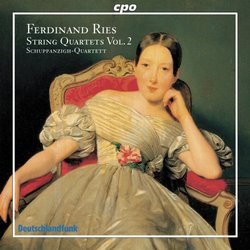| All Artists: Ferdinand Ries Title: Ferdinand Ries: String Quartets, Vol. 2 Members Wishing: 0 Total Copies: 0 Label: Cpo Records Original Release Date: 1/1/2008 Re-Release Date: 2/26/2008 Genre: Classical Styles: Chamber Music, Historical Periods, Classical (c.1770-1830) Number of Discs: 1 SwapaCD Credits: 1 UPC: 761203722723 |
Search - Ferdinand Ries :: Ferdinand Ries: String Quartets, Vol. 2
CD Details |
CD ReviewsQuartets by a Student of Beethoven and Albrechtsberger J Scott Morrison | Middlebury VT, USA | 03/11/2008 (4 out of 5 stars) "Ferdinand Ries (1784-1838) was a piano student of Beethoven and a composition student of Albrechtsberger, one of Beethoven's major teachers. One would have expected that he would write music focusing on the piano, but he wrote many more string quartets than piano sonatas. In fact, his very first effort at composition was a string quartet written as a child for his father's birthday. He wound up writing twenty-five quartets, only some of which were published in his lifetime. The two quartets heard on this second volume of quartets put out by the cpo label are separated by many years. The Op. 70, No. 2 is his second published quartet and dates from 1816, the WoO (Without opus number) quartet in F Minor was written more than twenty years later and already by this time Ries's star had dimmed. He could not find a publisher for it and it remained in manuscript even though after his death his brother continued trying to get it published.
Quartet No. 2, Op. 70, No.2, in G Major is classically constructed, in the usual four movements. The first movement is in 6/8 time and tends to dance even though its content is predominantly dramatic; harmonically it moves far afield but never with any sense of harmonic dislocation. Its thematic content is rather subdued and not very memorable. The second movement, Andante, is a rather nondescript thing primarily in a minor key and partaking of what sound like folk elements. The Scherzo also uses folklike materials but somehow never quite takes off. Its trio in E Major is pleasant and tuneful. The finale is easily the most memorable of the quartet's movements with its lively first violin figurations and throbbing harmonic underpinnings. It is a truncated sonata allegro with some elements of variation form. The original-instruments Schuppanzigh Quartet (named, of course, after Beethoven's great friend and Ries's contemporary, violinist Ignaz Schuppanzigh) play it and the subsequent quartet in fine style. The Quartet WoO 48 in F Minor is an altogether more successful work. It is in five movements, two of them -- I and III -- continued into the next movement without break, which suggests that it was influenced by Beethoven's trailblazing last quartets. Both the thematic and formal qualities of this quartet are miles above those of the Second Quartet. This is a major quartet just now being unearthed for our delight. It is predominantly dramatic in thrust but there are moments both of repose and of gaiety. The first movement is, unusually, a slow modified rondo followed immediately by bustling allegro. The third movement is a major key largo (the booklet notes persist in saying it is in A flat minor, which it definitely is not) that merges into a minuet that is classical except for some undertones of mystery. The finale is the quartet's only sonata allegro. Considering that it is placed against the two earlier bipartite large movements (I-II, III-IV) one is a little surprised that it lasts only seven minutes; this brevity is counterbalanced by it motivic and harmonic density. It is definitely the focal movement of the entire quartet. Further, it is, in spite of being in the minor, a generally sunny work. It is the most Beethovenian movement on the entire disc, reminding one not of the later quartets but of something out of the Op. 59 set. I was really taken by this movement and found myself listening to it again and again. Bottom line: A bit of a curate's egg -- 'parts of it were very good' -- with the somewhat colorless Second Quartet as against the structurally unusual and far more impactful F Minor Quartet. For those who are exploring Ries's output closely, this gets a recommendation. For those who have yet to hear any of Ries's music I'd suggest they begin with some other of his chamber music Ferdinand Ries: Septet & Octet or a volume of his symphonies Ferdinand Ries: Symphonies Nos. 7 & 8 [Hybrid SACD]. Scott Morrison " |

